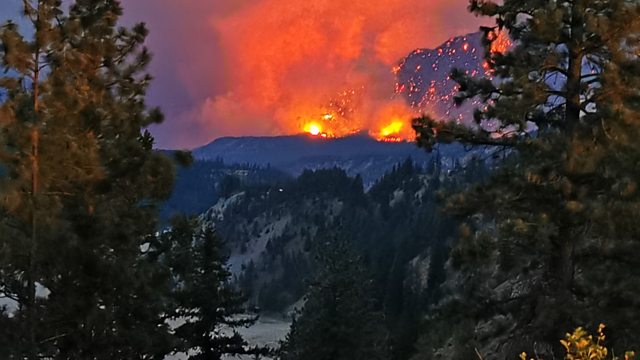Human induced climate change heats up fast
Scientists say the record-breaking Pacific North-West heatwave of recent weeks must have been caused by human induced climate change, while the mechanism remains a mystery.
Scientists say the record-breaking Pacific North-West heatwave of recent weeks must have been caused by human induced climate change, but as Geert Jan van Oldenborgh explains to Roland Pease, despite a herculean effort to analyse the event in just a week, the precise mechanism to cause such an extreme and sudden event is so far bewildering climate modellers, exceeding even worst expectations.
Looking to the skies, Rosita Kokotanekova of the European Southern Observatory and colleagues have been getting excited about the discovery of a comet maybe twice as large as any observed before. Being so big, it has been spotted much further out from the sun and – if the best telescopes can be convinced to join the fun – will provide astronomers a chance to observe the core of the comet before the solar heat induces a gaseous coma to form as it nears the point in its orbit closest to the sun. It will be around for the next decade before continuing its several million year journey around our mutual star.
But it won’t get terribly close to earth, at least not as close as lumps of an asteroid that fell onto a driveway in the UK earlier this year. Dr Ashley King of the UK’s Natural History Museum is leading a consortium of scientists (benefitting from a rapid research grant by the UK’s STFC) who have now officially classified it and named it. The Winchcombe meteorite is a CM carbonaceous chondrite, meaning it represents the unspoilt early building blocks of the solar system. Falling like 4.5 billion year old leftover celestial lego, only a few are known around the world but perhaps none have been in scientists hands in such a short period of time, continuing its pristine survival.
Dr Pablo Tsukayama has published a preprint paper announcing a new variant of interest in the ongoing evolution of the SARS-CoV2 virus. Now named by the WHO as the Lambda variant, it seems it has driven the pandemic for much of this year in Peru – as much as 80% of cases – and large fractions of the outbreak elsewhere in South America. But as Pablo suggests, the reason we don’t know as much about it as for example the Alpha or Delta variants is likely because it hasn’t thus far affected the countries best equipped to do the analysis. Maybe that could change.
Image: Wildfires in Lytton, British Columbia
Credit: ProPics Canada Media Ltd/Getty Images
Presenter: Roland Pease
Producer: Alex Mansfield
Last on
More episodes
Broadcasts
- Thu 8 Jul 2021 19:32GMT�鶹�� World Service
- Fri 9 Jul 2021 03:32GMT�鶹�� World Service Australasia, South Asia & East Asia only
- Fri 9 Jul 2021 04:32GMT�鶹�� World Service Americas and the Caribbean
- Fri 9 Jul 2021 08:32GMT�鶹�� World Service
- Fri 9 Jul 2021 12:32GMT�鶹�� World Service Australasia, UK DAB/Freeview, News Internet, Online & Europe and the Middle East only
- Sun 11 Jul 2021 01:32GMT�鶹�� World Service Americas and the Caribbean & News Internet only
Podcast
-
![]()
Science In Action
The �鶹�� brings you all the week's science news.


